News and agenda
21 May 2024
Strings that can vibrate forever (kind of)
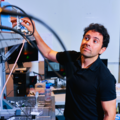
Researchers from TU Delft and Brown University have engineered string-like resonators capable of vibrating longer at ambient temperature than any previously known solid-state object — approaching what is currently only achievable near absolute zero temperatures. Their study, published in Nature Communications, pushes the edge of nanotechnology and machine learning to make some of the world’s most sensitive mechanical sensors.
04 April 2024
Ron van Ostayen about improved production of chips at BNR Wetenschap Vandaag podcast

Ron van Ostayen vertelt over verbeterde productie van chips door middel van zwevende wafers
02 April 2024
TU Delft and VDL ETG T&D research contactless wafer handling for better chip production
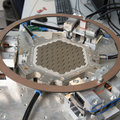
Every time the robotic arm picks up a wafer for placement in the chip machine, very small particles are generated which are harmful for the chip production process. The Faculty of Mechanical Engineering from TU Delft is working on new generation wafer handlers that can handle wafers without particle generation.
21 March 2024
Mechanical engineering at nano-scale requires clean environment

When working at the nanoscale, even a speck of dust can cause disruptions. That is why you find several clean rooms across the TU Delft Campus. In the clean room of Mechanical Engineering, researchers have the unique possibility to build mechanical structures at nanoscale, from top-down by sculpting materials and bottom-up by additive nanomanufacturing. The resulting devices find applications in a variety of fields, from biology to material science.
20 March 2024
Gerard Verbiest in BNR podcast

Researcher Gerard Verbiest works on new chip technology using sound. Together with researchers at ASML, he investigates, among other things, how to apply sound to look inside a chip.
05 January 2024
Richard Norte's research about a new ultra strong material in BNN Breaking

A material that doesn't just rival the strength of diamonds and graphene, but boasts a yield strength 10 times greater than Kevlar, renowned for its use in bulletproof vests.
13 December 2023
NWO grant for developing multi-purpose flat optical components
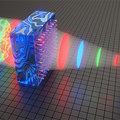
More and better optics with less. That is the ambition of the AWAVE consortium, led by TU Delft. The researchers will develop a flat optical component that might replace all curved optical components, such as lenses, in the future. This flat component should also be easy to recycle and contain fewer harmful substances.
08 December 2023
New 3D co-culture model to study the effect of proton therapy on aggressive brain cancer
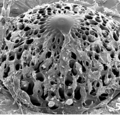
Researchers at TU Delft designed novel 3D-engineered scaffolds inspired by the geometry of the brain microvasculature. The micro-structures were co-cultured with both glioblastoma, an aggressive brain cancer, and endothelial cells, the building blocks of blood vessels. This model enabled researchers to study the effect of proton therapy on glioblastoma and uncovered a possible protective role of endothelial cells on cancer cells.
23 November 2023
ERC Consolidator Grant for ultra-sensitive 2D material membranes in frequency-based metrology and bacteria sensing
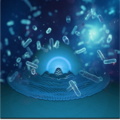
Last year, scientists at TU Delft achieved a remarkable feat by using graphene to capture the sound of an individual bacterium. In order to improve these kind of 2D ultra-sensitive sensors, the nanomechanics of this material have to be studied in more detail. Farbod Alijani, associate professor at the faculty of Mechanical, Maritime and Material Engineering, received an ERC Consolidator Grant for this project.
02 November 2023
TU Delft researchers discover new ultra strong material for microchip sensors
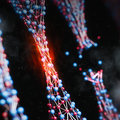
A material that doesn't just rival the strength of diamonds and graphene, but boasts a yield strength 10 times greater than Kevlar, renowned for its use in bulletproof vests.